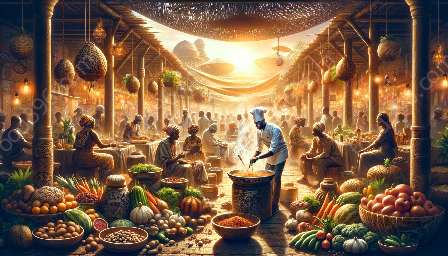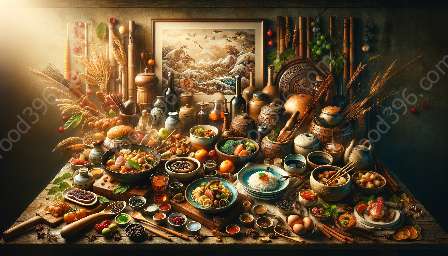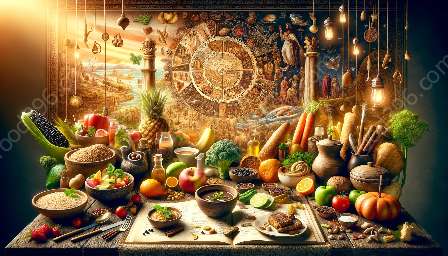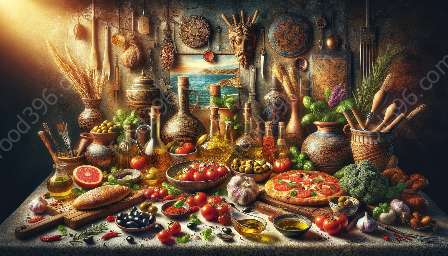Spain has an incredible culinary history that has been shaped by a variety of influences, resulting in a diverse and flavorful cuisine that reflects the country's rich cultural heritage. From its ancient roots to modern-day innovations, Spanish cuisine has captivated the world with its iconic dishes and vibrant flavors. Let's delve into the fascinating history of Spanish cuisine, exploring its evolution, key ingredients, and cultural significance within the broader context of cuisine history and food & drink.
The Ancient Roots of Spanish Cuisine
The history of Spanish cuisine can be traced back thousands of years to the ancient civilizations that inhabited the Iberian Peninsula. The Phoenicians, Greeks, Romans, and Moors all left a lasting culinary legacy, introducing new ingredients, cooking techniques, and flavors that continue to influence Spanish food to this day.
The Phoenicians were known for their trade in spices and introduced the cultivation of olives and grapes, laying the foundation for the production of olive oil and wine in Spain. The Greeks introduced the concept of communal dining and the use of honey in cooking, while the Romans expanded agricultural practices and introduced new foodstuffs such as wheat, barley, and legumes.
However, it was the Moors who had the most significant impact on Spanish cuisine, introducing exotic spices such as saffron, cinnamon, and cumin, as well as techniques like the use of nuts in cooking and the art of preserving fruits and nuts in honey. The Moors also brought rice, which played a pivotal role in the development of one of Spain's most iconic dishes, paella.
The Influence of Global Explorations
During the Age of Exploration, Spain emerged as a dominant maritime power, leading to a significant exchange of culinary influences with the New World. The introduction of ingredients such as tomatoes, peppers, potatoes, and corn transformed Spanish cuisine, leading to the creation of new dishes and flavor combinations that are now synonymous with the country's culinary identity.
Spanish explorers and conquistadors also brought back gold, silver, and spices from the Americas, which contributed to the opulence and refinement of Spanish cuisine during the Renaissance. The influx of new ingredients sparked a culinary revolution, leading to the development of dishes like gazpacho, a refreshing cold soup made from tomatoes, peppers, and cucumber, as well as the iconic Spanish potato omelet, known as tortilla española.
Regional Diversity and Iconic Dishes
One of the most remarkable aspects of Spanish cuisine is its diversity, with each region boasting its own unique culinary traditions, ingredients, and iconic dishes. From the seafood-rich cuisine of the Galician coast to the hearty stews of Castilla-La Mancha and the vibrant flavors of Andalusian cuisine, Spain's regional diversity is a reflection of its varied landscape and cultural heritage.
Some of the most celebrated dishes in Spanish cuisine include:
- Paella: Originating from the region of Valencia, paella is a flavorful rice dish often featuring a combination of seafood, chicken, rabbit, and a variety of vegetables, seasoned with saffron and paprika.
- Jamon Ibérico: Spain is renowned for its cured ham, with Jamon Ibérico being one of the most prized varieties. Made from acorn-fed Iberian pigs, the ham is aged to perfection, resulting in a rich and complex flavor profile.
- Gazpacho: This refreshing cold soup made from ripe tomatoes, bell peppers, cucumber, and garlic is a beloved staple during the hot summer months, showcasing the bounty of fresh produce available in Spain.
- Tortilla Española: A simple yet iconic dish, the Spanish potato omelet is made with eggs, potatoes, and onions, creating a satisfying and versatile dish that can be enjoyed at any time of day.
- Churros con Chocolate: This indulgent treat consists of crispy, fried churros served with a rich, thick chocolate dipping sauce, making it a popular dessert or snack across Spain.
The Cultural Significance of Food and Drink in Spain
In Spain, food and drink are deeply woven into the fabric of daily life and hold great cultural significance. Meals are viewed as a time for gathering with family and friends, and the act of sharing a meal is cherished as a symbol of camaraderie and hospitality. Traditional Spanish cuisine is often enjoyed with a glass of wine or a refreshing glass of sangria, further enhancing the social aspect of dining.
Furthermore, the concept of tapas, small plates of appetizers or snacks, exemplifies the convivial nature of Spanish dining, encouraging people to share a variety of flavorful dishes while enjoying lively conversation. The tradition of tapas has become a hallmark of Spanish culinary culture, both within Spain and around the world.
The Modern Evolution of Spanish Cuisine
While embracing its rich culinary heritage, Spain's contemporary food scene also reflects a spirit of innovation and creativity, with a new generation of chefs redefining traditional dishes and techniques. Spanish cuisine has gained global recognition for its avant-garde approach to gastronomy, with renowned chefs such as Ferran Adrià and Joan Roca leading the charge in pushing culinary boundaries and elevating the dining experience to an art form.
From molecular gastronomy to cutting-edge culinary techniques, Spain has become a hotbed of culinary experimentation, attracting food enthusiasts and gastronomes from around the world. The country's diverse landscape and rich culinary history continue to inspire chefs to create imaginative dishes that celebrate both tradition and innovation.
In Conclusion
Spanish cuisine has evolved over millennia, shaped by a tapestry of influences that have left an indelible mark on the country's culinary landscape. From the ancient civilizations of the Phoenicians, Greeks, Romans, and Moors to the global explorations of the Renaissance and the modern renaissance of culinary innovation, Spanish cuisine continues to captivate food lovers and enthusiasts worldwide.
With its rich regional diversity, iconic dishes, and deep cultural significance, Spanish cuisine reflects the soul of a nation, celebrating tradition while embracing the spirit of innovation. Whether savoring a paella by the Mediterranean coast or indulging in churros con chocolate in a bustling city square, the delights of Spanish cuisine invite us to embark on a flavorful journey through the history, culture, and passion that define this remarkable culinary tradition.




















